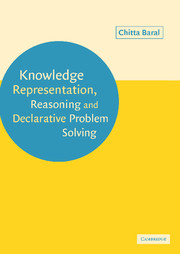Book contents
- Frontmatter
- Contents
- Preface
- 1 Declarative programming in AnsProlog*: introduction and preliminaries
- 2 Simple modules for declarative programming with answer sets
- 3 Principles and properties of declarative programming with answer sets
- 4 Declarative problem solving and reasoning in AnsProlog*
- 5 Reasoning about actions and planning in AnsProlog*
- 6 Complexity, expressiveness, and other properties of AnsProlog* programs
- 7 Answer set computing algorithms
- 8 Query answering and answer set computing systems
- 9 Further extensions of and alternatives to AnsProlog*
- Appendix A Ordinals, lattices, and fixpoint theory
- Appendix B Turing machines
- Bibliography
- Index of notation
- Index of terms
5 - Reasoning about actions and planning in AnsProlog*
Published online by Cambridge University Press: 13 August 2009
- Frontmatter
- Contents
- Preface
- 1 Declarative programming in AnsProlog*: introduction and preliminaries
- 2 Simple modules for declarative programming with answer sets
- 3 Principles and properties of declarative programming with answer sets
- 4 Declarative problem solving and reasoning in AnsProlog*
- 5 Reasoning about actions and planning in AnsProlog*
- 6 Complexity, expressiveness, and other properties of AnsProlog* programs
- 7 Answer set computing algorithms
- 8 Query answering and answer set computing systems
- 9 Further extensions of and alternatives to AnsProlog*
- Appendix A Ordinals, lattices, and fixpoint theory
- Appendix B Turing machines
- Bibliography
- Index of notation
- Index of terms
Summary
In Chapter 4 we formulated several knowledge representation and problem solving domains using AnsProlog* and focused on the program development aspect. In this chapter we consider reasoning about actions in a dynamic world and its application to plan verification, simple planning, planning with various kinds of domain constraints, observation assimilation and explanation, and diagnosis. We do a detailed and systematic formulation – in AnsProlog* – of the above issues starting from the simplest reasoning about action scenarios and gradually increasing its expressiveness by adding features such as causal constraints, and parallel execution of actions. We also prove properties of our AnsProlog* formulations using the results in Chapter 3.
Our motivation behind the choice of a detailed formulation of this domain is twofold. (i) Reasoning about actions captures both major issues of this book: knowledge representation and declarative problem solving. To reason about actions we need to formulate the frame problem whose intuitive meaning is that objects in the worlds do not normally change their properties. Formalizing this has been one of the benchmark problems of knowledge representation and reasoning formalisms. We show how AnsProlog* is up to this task. Reasoning about actions also forms the ground work for planning with actions, an important problem solving task. We present AnsProlog encodings of planning such that the answer sets each encode a plan. (ii) Our second motivation is in regard to the demonstration of the usefulness of the results in Chapter 3.
- Type
- Chapter
- Information
- Publisher: Cambridge University PressPrint publication year: 2003



